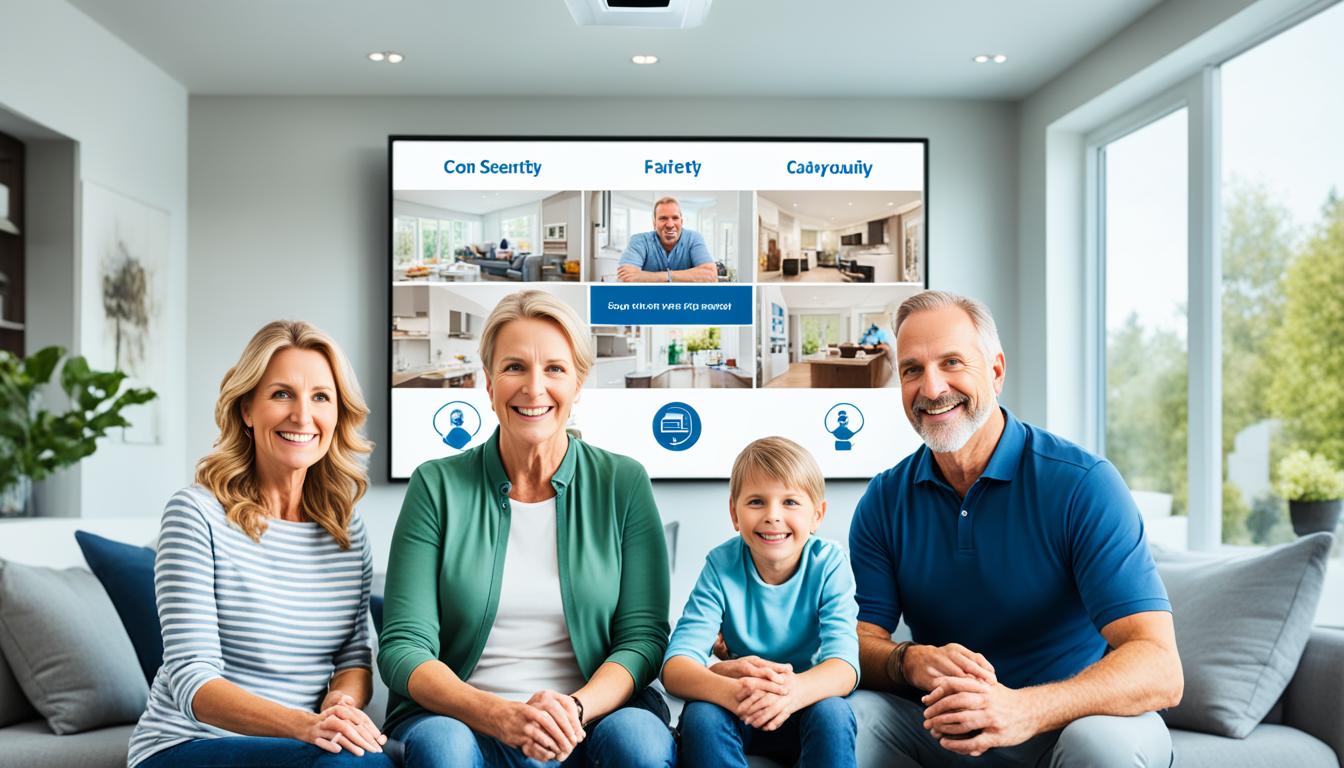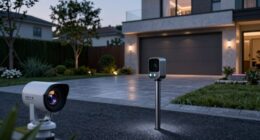Did you know that 60% of burglars take into account the presence of home security camera systems before choosing a target? This surprising statistic emphasizes the significant impact that a strong DIY home security plan can have on safeguarding your home. In a world where self-empowerment merges with technology, you can assume control over your home security without spending a fortune. From security cameras to basic burglar alarms, you can incorporate cost-effective tactics that not only discourage crime but also boost your personal safety. In this guide, you will discover practical and user-friendly DIY techniques to fortify your home, ensuring that you feel secure in your own sanctuary.
Key Takeaways
- 60% of burglars are deterred by the presence of home security cameras.
- DIY home security systems are now more accessible thanks to wireless technology.
- Installing motion detector lighting significantly reduces dark entry points for burglars.
- Simple door and window alarms can effectively deter potential break-ins.
- Additional barriers like thorny plants can add a layer of physical protection near windows.
Understanding Your Home Security Needs
Every homeowner should prioritize understanding their home security needs. This process begins with identifying vulnerable entry points throughout your property. Recognizing these sites allows you to implement effective preventive measures to safeguard against potential threats.
Assessing Vulnerable Entry Points
Vulnerable entry points, such as doors, windows, and garages, typically present easy access for thieves. Carefully evaluating these areas can highlight weaknesses in your current security measures. Consider the following strategies:
- Inspect all entry doors for sturdy locks and hinges.
- Evaluate window locks and consider adding additional security bars or locks.
- Ensure garages are secure with robust doors and systems.
- Upgrade sliding glass door locks with additional security devices.
Your assessment will better align with your home security needs by creating a comprehensive plan to fortify these points of entry.
Identifying Common Burglary Methods
Understanding common burglary methods significantly enhances your security planning. Burglars often exploit predictable routines or soft targets, particularly during the day when homeowners are away. Here are some common tactics:
- Daylight break-ins occur when the house appears vacant.
- Lock picking can bypass standard door locks.
- Breaking glass is a quick and noisy method to enter through windows.
- Unsecured sliding doors can easily be forced open.
By familiarizing yourself with these burglary methods, you can implement targeted strategies to effectively secure your home.
Benefits of DIY Home Security
Choosing DIY home security solutions offers many advantages for homeowners looking to enhance their safety without breaking the bank. These options allow you to implement cost-effective DIY solutions tailored to meet your specific needs. With the ability to customize your home protection, you can address vulnerabilities effectively while saving money.
Cost-Effective Solutions
One of the most appealing aspects of DIY home security is the affordability. Many options come without the burden of long-term contracts or commitments. For example, Ring Alarm provides self-monitoring at just $30 a year, while professional monitoring starts at only $20 monthly, which is a fraction of what traditional services like ADT often charge. Furthermore, brands like SimpliSafe offer tempting discounts on refurbished devices, making it even easier to implement cost-effective DIY solutions. With an opportunity to lower homeowner’s insurance premiums by up to 20%, engaging in DIY home protection turns into an intelligent financial decision.
Customization Based on Your Needs
Customizing home security allows you to create a system that directly addresses the unique needs of your household. You can select products and installation methods that make sense for your lifestyle. Many DIY systems integrate versatile smart home products, such as video doorbells and smart locks, enhancing your security while improving comfort. These systems enable remote monitoring, keeping you informed about your property even when you’re away. By streamlining your home security with features that cater directly to your preferences, you design an effective strategy that supports your peace of mind.

Install Security Cameras
Enhancing your home’s security with security camera installation is crucial in deterring theft and monitoring your property. By assessing various types of security cameras, you can determine the best fit for your needs. This section will aid you in selecting the right cameras and finding ideal locations for effective camera placement.
Choosing the Right Type of Cameras
When deciding on types of security cameras, consider features like resolution and connectivity. Wireless options stand out in terms of flexibility and ease of installation, making them popular among homeowners. Look for cameras that provide at least 720p or 1080p video quality for clear imagery. Note that higher resolutions may drain batteries faster. Cameras with wide fields of view can help maximize your surveillance coverage, allowing you to monitor extensive areas both indoors and outdoors.
Best Locations for Camera Installation
Strategic placement of cameras ensures optimal coverage for your surveillance systems. Focus on critical areas such as:
- Entry points (doors and windows)
- Driveways and garages
- Backyards and patios
- Common areas around your property
By positioning your cameras in these locations, you enhance the effectiveness of your security camera installation, which can significantly reduce the likelihood of a break-in. Remember that integrating your cameras with a DIY alarm system can further bolster your home’s security features.

| Camera Type | Feature | Advantages |
|---|---|---|
| Wireless | Flexible installation | Can be positioned anywhere without wiring constraints |
| Wired | Constant power supply | Generally more reliable for long-term use |
| Indoor | Compact design | Suitable for monitoring specific areas inside your home |
| Outdoor | Weatherproof features | Resistant to environmental conditions, ideal for outside surveillance |
Investing in the right security cameras can lead to a significant decrease in burglary attempts. With effective surveillance systems in place, you can gain peace of mind, knowing your home is monitored and protected.
Incorporate Motion Detector Lighting
Installing motion detector lights can significantly enhance your home security lighting while providing greater visibility deterrence against potential intruders. These devices automatically illuminate when they detect movement, making it harder for burglars to breach your home undetected. Additionally, most motion sensor lights are designed to be mounted six to ten feet above the ground for optimal performance, ensuring effective coverage around your property.
The Effectiveness of Visibility in Deterrence
When motion detector lights activate, the sudden brightness can deter unauthorized individuals from approaching your home. The very presence of these lights creates an enhanced sense of security, signaling that your home is being monitored. Motion activated lighting not only conserves energy by operating only when needed, but it also offers significant cost savings by eliminating the need for constant illumination.
Recommended Products and DIY Installation Tips
There are numerous options available when considering motion detector lights, such as the highly-rated Reolink Floodlight which provides 2,000 lumens and various lighting modes. For a more eco-friendly choice, solar-powered models are simple to install and do not require complex wiring.
Installing motion sensor lights is a straightforward DIY project. The process typically includes:
- Shutting off the electricity to the area.
- Removing the existing fixture.
- Wiring the new light by connecting neutral, ground, and hot wires.
- Adjusting various settings like detection range and time delay.
- Sealing any openings to prevent moisture ingress.
- Testing the functionality to ensure everything is operating correctly.
Consider choosing lights with different sensor options including PIR, ultrasonic, and microwave sensors, each utilizing unique detection technologies. You can enhance your home security system’s capabilities by exploring wired+wireless controllers that allow for additional lighting functionalities.

| Feature | PIR Sensor | Ultrasonic Sensor | Microwave Sensor |
|---|---|---|---|
| Detection Method | Heat signatures | Sound waves | Radio waves |
| Range | Up to 40 feet | Up to 30 feet | Up to 50 feet |
| Environmental Sensitivity | Low | Moderate | High |
| Power Consumption | Low | Moderate | Low |
Investing time in installing motion detector lights can significantly elevate the security level of your property while providing peace of mind. These simple enhancements allow you to secure your home in a practical, efficient, and cost-effective manner.
Secure Your Doors and Windows
Ensuring the security of your doors and windows is essential for maintaining a safe home. A well-fortified entry point can deter unauthorized access and create a strong barrier against potential intruders. Understanding the range of options available for reinforcing door locks and enhancing window security can significantly improve your home’s overall safety.
Options for Reinforcing Door Locks
Incorporating effective door security solutions is crucial. Here are some reliable methods to enhance the strength of your door locks:
- High-Quality Deadbolts: Installing these can reduce burglary risk by 60%.
- Security Strike Plates: Upgrading to stronger plates can make traditional locks harder to bypass.
- Door Jamb Reinforcement Kits: These can decrease break-in attempts by an impressive 70%.
- Smart Locks: Offering advanced features, smart locks lower unauthorized access chances by 35%.
Window Security Solutions to Consider
Windows represent a significant vulnerability in your home’s security. Effective window reinforcement can keep potential intruders at bay. Consider these options:
- Window Security Film: A quick and budget-friendly solution, this film comes in various types, including tinted and clear, adding an extra layer of protection.
- Pin Locks and Turnbuckle Locks: Common window locks that provide a basic level of security.
- Impact-Resistant Glass: Stronger than traditional glass, it offers excellent resistance to breakage.
- Window Security Screens: Reinforced frames with steel-coated screens are effective at discouraging break-ins.
- Alarm Sensors: Adding sensors to your windows helps prevent unauthorized access, enhancing your defense system without requiring a full alarm setup.

Taking proactive measures with your doors and windows can significantly enhance your home’s protection. By utilizing effective door security solutions and reliable window reinforcement methods, you set your home up for a greater defense against potential threats.
DIY Home Security Alarms
When considering enhancing your home security, DIY security alarms play a crucial role. With various home security alarm types available, it’s essential to find the right fit for your needs and install them correctly. Such self-install alarms work as effective deterrents to unauthorized access, safeguarding your property effortlessly.
Types of Alarms to Consider
Several types of alarms can be integrated into your DIY security system. Notable options include:
- Door and Window Alarms: These alarms trigger when a door or window is opened unexpectedly, alerting you and potentially scaring off intruders.
- Glass Break Detectors: Designed to sense the sound of breaking glass, these alarms add an extra layer of protection to your home.
- Motion Sensors: Placed strategically around your property, these sensors activate when motion is detected, providing instant alerts.
Installation Tips for a DIY System
Installing self-install alarms can be a straightforward process. Follow these tips to ensure effectiveness:
- Choose a central location for your keypad to allow easy access for arming and disarming your system.
- Test all sensors and alarms after installation to ensure they function correctly.
- Follow the manufacturer’s instructions carefully, as each system may have specific requirements for setup.
- Ensure battery and cellular backup are in place. This redundancy guarantees your system operates even during power outages.
- Utilize apps for monitoring, such as those provided by systems like ADT or Ooma, for remote control and notifications.
Utilizing DIY security alarms empowers you to take charge of your home security. By selecting the right alarm types and following installation best practices, you can enhance safety and peace of mind.

| Alarm Type | Functionality | Installation Complexity |
|---|---|---|
| Door and Window Alarms | Detects unauthorized entry | Easy |
| Glass Break Detectors | Monitors for breaking glass sounds | Moderate |
| Motion Sensors | Senses movement within the area | Easy |
Effective Use of Yard Signs and Stickers
Using security yard signs and effective security stickers in your home can significantly impact the psychological deterrence of potential intruders. Although the effectiveness of signs and stickers can be debated, many studies reveal that visible security measures can lead burglars to rethink their approach. A taped-up sticker can create an illusion of security that makes your property less appealing, reducing the likelihood of a break-in.
Psychological Deterrence of Fake Security Signs
Statistics show that a burglary occurs every 23 seconds in the United States. You can effectively reduce your vulnerability simply by displaying security yard signs or even fake security signs of well-known brands purchased online, typically costing between $15 and $20. Research indicates that 25% of burglars would avoid homes with security system signs, favoring less protected properties. The presence of signage not only deters burglar activity but may also lead to fewer damages incurred in a break-in attempt.
Designing Effective Stickers for Visibility
Creating effective security stickers requires attention to design and placement. Here are some tips to ensure they are impactful:
- Bold and Clear Text: Use large fonts for essential phrases like ‘Protected by’ or ‘Security System Active’.
- High-Contrast Colors: Bright colors can grab attention, especially against darker backgrounds.
- Strategic Placement: Place stickers near entry points such as doors and windows, where they can be easily seen.
- Tactical Confusion: Consider using stickers from different companies to confuse potential intruders about the actual security system in place.
A combination of security yard signs and effective security stickers can serve not only to deter break-ins but also to create a sense of safety for you and your family. Ultimately, these simple yet impactful measures can significantly reduce the likelihood of becoming a target.

Additional DIY Security Measures
To create a robust defense system for your home, consider implementing additional DIY security measures that can significantly enhance door security and protect against unauthorized entry. One effective way to fortify your premises is by utilizing tamper-proof screws. Screws like Allen head, Torx head, or hex-head cap screws can thwart thieves attempting to remove hinges or other hardware, adding an extra layer of safety.
Using Tamper-Proof Screws and Enhanced Hinges
In addition to secure screws, enhancing your door’s hinges is crucial. Opt for heavy-duty strike plates and longer screws to reinforce weak spots on your doors, making them more resistant to kick-ins. Products like Door Armor, made from sturdy 16-gauge galvanized steel, can be a game changer in bolstering your door and jamb against forced entry, offering peace of mind.
Innovative Lock Installation Techniques
Incorporate innovative lock installation techniques to further secure your home. Installing a deadbolt protection device not only makes picking locks much harder but also provides an indispensable layer of security. Consider using locks with thicker shackles and less exposed mechanisms, such as the Master Lock Magnum. By combining all these strategies, you create a formidable DIY home security system, reducing the chance of a break-in and ensuring that your home remains a safe haven.









